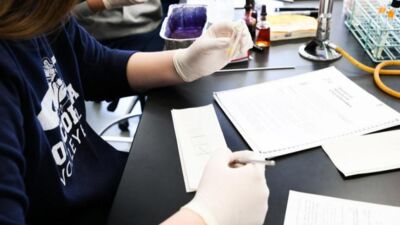Career Spotlight: Pharmacist

A pharmacist is a trained professional with expert knowledge of the best practices for management, dosage and prescription of various medications that sustain or enhance the quality of life of many populations. Pharmacists are vital in the modern world for their knowledge of these pharmaceuticals and how to provide them to patients in a safe, effective manner. Concordia University, Nebraska can prepare you for a career in this exciting field in its pre-pharmacy program, which allows students to choose a major that interests them while also taking classes in chemistry, biology and physics.
Pharmacists must earn a Doctor of Pharmacy (Pharm.D.) degree from an accredited pharmacy program. Most schools require students to have met specific course prerequisites that can be completed in two years or less, but the vast majority of successful applicants hold a bachelor’s degree that includes these courses as part of a broad liberal arts curriculum. To practice as a pharmacist, graduates must also obtain licensure in compliance with their state’s requirements and may even need to complete a specified number of hours as a pharmacy intern.
Once students complete this course of training, then comes the exciting part: practicing as a pharmacist! Employment options for pharmacists are vast and varied, especially with the completion of a one- or two-year training residency and certification in a more specialized field, like pediatrics, oncology or cardiology. Specialized positions are often clinical in nature; certification for practice in them is provided through the Board of Pharmacy Specialties.
Professional pharmacists may work in a variety of locations, such as independent pharmacies, hospitals or clinics and pharmaceutical companies. They interact with customers who are in need of prescription medications, the physicians who prescribe them, and even the companies who manufacture them. Their extensive knowledge of all types of medications allows them to advise both medical professionals and laymen in the use, dosage and side effects of these drugs. They will also know whether a patient’s medical history, allergies and other drugs taken will put them at a higher risk for an adverse reaction to a newly prescribed medication.
Pharmacists who work in clinics, hospitals or independent pharmacies – in other words, those who engage in direct patient interaction – often also administer vaccines and advise patients in the best general practices for their health. Their knowledge of medications and basic health topics allows them to teach patients how to live a high-quality life while taking a particular medication or combination of medications. Some pharmacists in certain specialties, such as Certified Diabetes Care and Education specialists, can provide special counsel on dietary practices, inform when and how to take medications and monitor patients’ signs and symptoms.
In addition to their competitive salary – the median being around $136,000 – pharmacists have ample opportunities for professional development throughout their career. In fact, continuing education is often required to maintain licensure as a pharmacist. These requirements often take place at conferences or through online webinars in topics like pharmacy law, general practice, drug compounding and more.
The field of pharmacy is growing about as fast as average compared to the rest of the United States. However, that means that field openings for new pharmacists are consistently present! With an annual growth rate of 5%, about 337,000 pharmacists are currently in the field, with over 18,000 new employees being needed each year.
Why choose a career as a pharmacist? For many reasons – pharmacists are in-demand, well-educated professionals with continued opportunities for personal and career growth. They can practice with populations and in settings of their choice with materials that are of interest to them. For detail-oriented students with a strong interest in pharmaceuticals, helping others live fulfilling lives and working as a medical professional, pharmacy is an ideal career choice.
The pre-pharmacy program at Concordia Nebraska allows students to major in a field that interests them while taking classes that serve as prerequisites for further education in pharmacy. Concordia will prepare you for service to others in the program, providing a holistic liberal arts education paired with the rigor of courses in the natural sciences. Learn more about the pre-pharmacy program here.
Interested in the pre-pharmacy program at Concordia?
Related Stories


